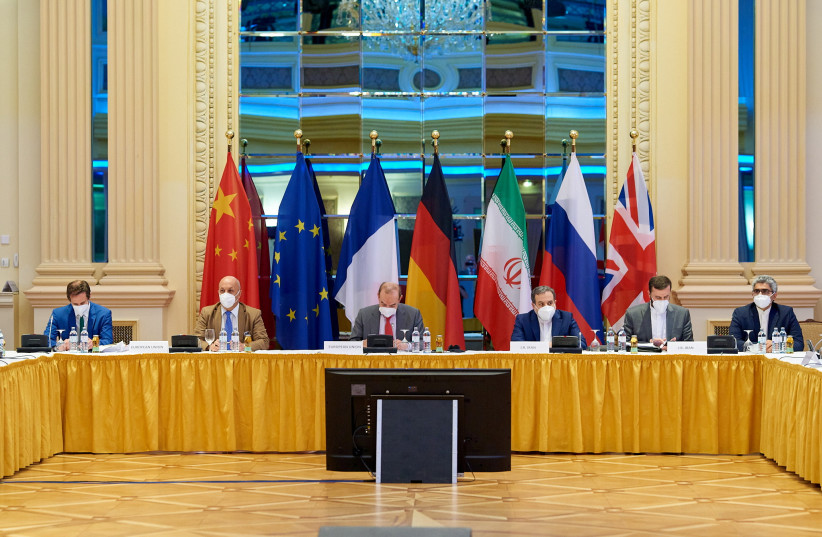It was encouraging to hear that US President Joe Biden recognizes that members of Iran’s Islamic Revolutionary Guard Corps Quds Force are terrorists, according to comments made by State Department Principal Deputy Spokesperson Jalina Porter on Friday.
“The president shares the chairman’s view that IRGC Quds Forces are terrorists, and beyond that we aren’t going to comment on any of the topics in the nuclear talks,” Porter said in a press briefing.
Iran is demanding that the IRGC be removed from the US Foreign Terrorist Organization (FTO) list as part of an agreement. It is a welcome development that Biden will not concede to this demand, and we can assume that Israel’s stand on the subject – along with that of other allies in the region – played a role in this. Biden, however, reportedly views the IRGC designation as a separate issue from the nuclear one.
This is a dangerous mistake. It makes no sense at all to admit that the Islamic Republic’s armed corps sponsors global terrorism and yet then to proceed with negotiations that would allow Iran to swiftly reach a nuclear threshold. The Iranian threat cannot be split for convenience. And it should not be underestimated.
While the world’s attention is focused on Russia’s deplorable invasion of Ukraine, the threat posed by Iran has not gone away. It would be wrong to give in to Iran in the hope that it will stick to a new deal, despite the evidence to the contrary from the 2015 Joint Comprehensive Plan of Action.

The inevitable lifting of sanctions that would accompany a new deal would encourage Iran and the IRGC and its proxy terrorist organizations to continue attacks on the Sunni Arab states and on Israel and, indeed, on targets around the world. Iran’s tentacles of terror via Hezbollah, Hamas and the Houthis spread far from Tehran; there’s good reason that the IRGC is on the list of terrorist organizations.
The announcement of the Biden administration position on the IRGC comes a week after Prime Minister Naftali Bennett’s diplomatic adviser Shimrit Meir was in Washington where she held intensive meetings with US National Security Advisor Jake Sullivan and other officials on the threat posed by Iran. Foreign Minister Yair Lapid also discussed the matter during his recent meetings with US Secretary of State Antony Blinken, and Ambassador to the US Mike Herzog has held meetings with officials and legislators in Washington.
Bennett and other Israeli leaders have been openly expressing their strong opposition to delisting the IRGC for several weeks, along with top Emirati and Bahraini officials, concentrating on this issue on which there should be a consensus. Both Democrats and Republicans in Congress have also expressed their opposition to removing the IRGC from the FTO list.
The topic of the Iran deal was obviously a central one on the agenda of the Negev Summit that Lapid hastily convened and hosted last month when an unprecedented four foreign ministers from Arab states joined him and Blinken at Sde Boker. Indeed, the 2020 Abraham Accords with the United Arab Emirates, Bahrain and Morocco (and Sudan to a lesser extent) were founded to a large measure from the threat to the Sunni Muslim countries posed by Iran, a threat Israel has long been facing and tackling.
Biden and the officials representing his administration have reportedly voiced their “unwavering support” for Israel. Words are not enough.
Signing a poor agreement with Iran will significantly increase the risks. It will not increase peace and stability in the region because there is no sign that this is what Iran seeks. Indeed, a new nuclear agreement is more likely to hamper the ability to handle the threats than to eliminate them.
And make no mistake – due to its sponsorship of terrorism – the Iranian threat is a truly global issue, not one limited to Israel and the Middle East alone.
An American refusal to delist the IRGC could stall the deal or even prevent it from going ahead if Iran decides to keep away from the Vienna talks as a result. However, if Biden views the issues of Iranian terrorism and Iran as a nuclear power as separate matters, this does not bode well.
It would be better to have no deal at all and to be free to take action than to have a bad deal which allows Iran to increase its nuclear capabilities, provides it with an influx of funds that can be used to continue funding terror and restricts the action of those who try to combat this threat and protect global peace.
